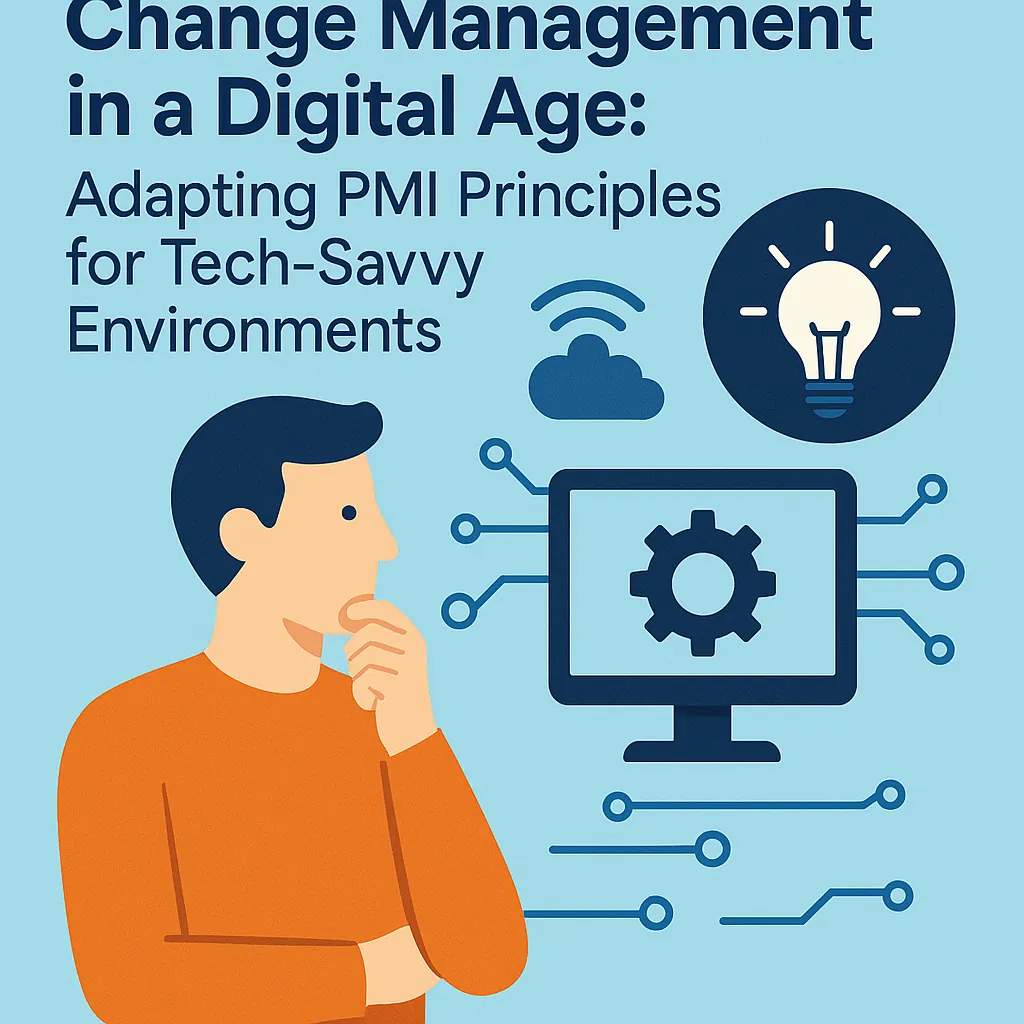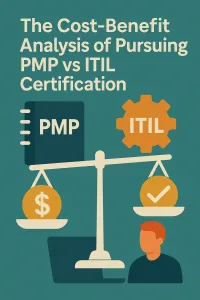Introduction
Change management has emerged as a critical discipline that ensures organizations can adapt and thrive amidst constant transformation. Change management refers to the structured approach to transitioning individuals, teams, and organizations from a current state to a desired future state. It is essential in project management as it helps mitigate resistance, fosters acceptance, and ensures that the intended benefits of change are realized. Effective change management not only enhances project success rates but also aligns organizational goals with the needs of stakeholders, making it a vital component of any project manager’s toolkit.
The Project Management Institute (PMI) has long been recognized for its foundational principles and certifications that guide project professionals in managing projects effectively. In today’s tech-focused environments, PMI principles remain highly relevant, providing a framework that supports the integration of change management practices into project execution. These principles emphasize the importance of clear communication, stakeholder engagement, and strategic alignment, which are crucial for navigating the complexities of digital transformation.
Digital transformation represents a fundamental shift in how organizations operate, driven by advancements in technology and changing market demands. This transformation impacts traditional change management practices by introducing new challenges and opportunities. For instance, the rapid pace of technological change requires project managers and change agents to be agile and responsive, adapting their strategies to accommodate new tools, processes, and cultural shifts within the organization. As a result, the integration of PMI principles with contemporary change management practices is essential for ensuring that organizations can successfully navigate the digital landscape while achieving their strategic objectives.
In this blog section, we will explore how the principles of change management, as outlined by PMI, can be adapted to meet the demands of a digital age, ultimately empowering technology-focused project managers and change agents to lead their organizations through successful transformations.
Understanding Change Management Certification from PMI
Effective change management is crucial for organizations striving to remain competitive. The Project Management Institute (PMI) offers a change management certification that equips project managers and change agents with the necessary skills to navigate these transformations successfully. This section delves into the significance of PMI’s change management certification, its objectives, key competencies, and how it enhances the capabilities of professionals in managing change.
What is Change Management Certification?
Change management certification is a formal credential that validates an individual’s expertise in managing organizational change effectively. The primary objectives of PMI’s certification program include:
- Providing a Structured Approach: The certification offers a framework for understanding and implementing change management processes, ensuring that project managers can lead their teams through transitions smoothly.
- Enhancing Professional Credibility: Earning this certification demonstrates a commitment to professional development and a deep understanding of change management principles, which can enhance a project manager’s credibility within their organization and industry.
Key Competencies and Knowledge Areas
PMI’s change management certification program covers several essential competencies and knowledge areas, including:
- Change Management Frameworks: Understanding various models and frameworks that guide change initiatives, including the ADKAR model, which focuses on awareness, desire, knowledge, ability, and reinforcement.
- Stakeholder Engagement: Learning how to identify key stakeholders, assess their needs, and develop tailored communication strategies to ensure their buy-in and support throughout the change process.
- Resistance Management: Gaining insights into common sources of resistance to change and strategies to address and mitigate these challenges effectively.
- Measurement and Evaluation: Developing skills to assess the impact of change initiatives and measure their success against predefined objectives.
These competencies are vital for project managers, especially in technology-driven environments where change is constant and often disruptive.
Enhancing Skills for Managing Change
Obtaining PMI’s change management certification significantly enhances the skills of project managers in several ways:
- Improved Change Leadership: Certified professionals are better equipped to lead change initiatives, fostering a culture of adaptability and resilience within their teams.
- Strategic Thinking: The certification encourages project managers to think strategically about change, aligning initiatives with organizational goals and ensuring that changes are sustainable in the long term.
- Increased Collaboration: With a solid understanding of change management principles, certified project managers can collaborate more effectively with cross-functional teams, ensuring that all aspects of a change initiative are considered and addressed.
The Digital Transformation Landscape
Digital transformation has become a critical focus for organizations aiming to remain competitive. This transformation encompasses a comprehensive shift in how organizations operate, leveraging technology to enhance processes, improve customer experiences, and foster innovation. Below are key points that define digital transformation, explore its drivers, and discuss the challenges organizations face during this transition.
Defining Digital Transformation and Its Components
Digital transformation refers to the integration of digital technology into all areas of a business, fundamentally changing how organizations operate and deliver value to customers. It involves several key components:
- Technology: This includes the adoption of advanced technologies such as cloud computing, artificial intelligence, big data analytics, and the Internet of Things (IoT). These technologies enable organizations to streamline operations, enhance decision-making, and create new business models.
- Processes: Digital transformation necessitates a reevaluation and redesign of existing processes to improve efficiency and responsiveness. This often involves automating workflows, adopting agile methodologies, and implementing data-driven decision-making practices.
- People: The human element is crucial in digital transformation. Organizations must invest in training and development to equip employees with the necessary skills to navigate new technologies and processes. Additionally, fostering a culture of innovation and adaptability is essential for successful transformation.
Exploring the Drivers of Digital Transformation
Several factors drive organizations to pursue digital transformation:
- Market Competition: The need to stay ahead of competitors who are also adopting digital technologies compels organizations to innovate and enhance their offerings.
- Customer Expectations: As customers increasingly demand seamless and personalized experiences, organizations must leverage digital tools to meet these expectations and improve customer engagement.
- Operational Efficiency: Organizations seek to reduce costs and improve efficiency through automation and optimized processes, which digital transformation can facilitate.
- Data Utilization: The ability to collect and analyze vast amounts of data allows organizations to make informed decisions, identify trends, and respond proactively to market changes.
Discussing the Challenges Organizations Face During Digital Transformation Efforts
While the benefits of digital transformation are significant, organizations often encounter several challenges:
- Resistance to Change: Employees may resist new technologies and processes, fearing job displacement or the need to learn new skills. Overcoming this resistance requires effective change management strategies and strong leadership.
- Integration Issues: Integrating new technologies with existing systems can be complex and may lead to disruptions if not managed properly. Organizations must ensure that their IT infrastructure can support new digital initiatives.
- Skill Gaps: The rapid pace of technological change can outstrip the current skill sets of employees. Organizations must invest in training and development to bridge these gaps and ensure their workforce is prepared for the digital landscape.
- Cultural Barriers: A culture that is not conducive to innovation and agility can hinder digital transformation efforts. Organizations need to cultivate a mindset that embraces change and encourages experimentation.
Impact of Digital Transformation on Change Management Practices
Digital transformation is not just a trend; it is a fundamental shift that is reshaping how organizations approach change management. As project managers and change agents navigate this new terrain, it is essential to understand how traditional methodologies are adapting to meet the demands of a tech-savvy environment. Here are some key points to consider:
- Shift from Traditional to Agile Methodologies: Traditional change management practices often relied on linear, step-by-step processes. However, the fast-paced nature of digital transformation necessitates a more agile and adaptive approach. Organizations are increasingly adopting frameworks that allow for iterative changes, enabling them to respond quickly to emerging challenges and opportunities. This shift emphasizes flexibility, collaboration, and continuous feedback, which are crucial in a digital context [10][11].
- Role of Technology Tools: The integration of technology tools has become a cornerstone of effective change management. Project management software and collaboration platforms facilitate communication and coordination among team members, making it easier to implement changes across various departments. These tools not only streamline processes but also enhance visibility into project progress, allowing for real-time adjustments and fostering a culture of transparency [10][12]. By leveraging these technologies, organizations can ensure that all stakeholders are aligned and informed throughout the change process.
- Importance of Data-Driven Decision-Making: In the digital age, data is a powerful asset that can significantly influence change management strategies. Organizations are increasingly relying on data analytics to inform their decisions, assess the impact of changes, and measure success. This data-driven approach enables project managers to identify trends, anticipate challenges, and make informed choices that align with organizational goals. By utilizing metrics and analytics, change agents can better understand the effectiveness of their strategies and adjust them as necessary to achieve desired outcomes [10][11][12].
Adapting PMI Principles for Tech-Savvy Environments
In the rapidly evolving landscape of project management, particularly within technology-driven sectors, the principles established by the Project Management Institute (PMI) must be adapted to meet the demands of digital transformation. This section explores how to effectively integrate PMI principles with change management practices tailored for tech-savvy environments, providing actionable strategies for project managers and change agents.
Key PMI Principles Relevant in a Digital Context
- Stakeholder Engagement: Engaging stakeholders remains a cornerstone of successful project management. In a digital age, this involves leveraging digital tools to facilitate communication and collaboration among diverse teams. Utilizing platforms that allow for real-time feedback and engagement can enhance stakeholder involvement and ensure alignment with project goals.
- Risk Management: The digital landscape introduces new risks, particularly related to technology adoption and integration. Adapting PMI’s risk management principles involves identifying potential technological disruptions and developing contingency plans that are agile enough to respond to rapid changes in the digital environment.
- Quality Management: Maintaining quality standards is crucial, even as projects become more tech-driven. Implementing continuous improvement processes and utilizing data analytics can help organizations monitor quality in real-time, ensuring that digital solutions meet the required standards.
Adapting PMI Principles for Agile and Tech-Driven Projects
- Embrace Agile Methodologies: Traditional PMI practices can be enhanced by incorporating agile methodologies, which emphasize flexibility and iterative progress. This approach allows project teams to respond quickly to changes and incorporate feedback more effectively, aligning with the fast-paced nature of digital projects.
- Utilize Technology for Change Management: Implementing change management strategies through digital tools can streamline processes. For instance, using project management software that integrates change management features can help track changes, manage resistance, and ensure user adoption of new technologies.
- Focus on Continuous Learning: In tech-savvy environments, fostering a culture of continuous learning is essential. PMI principles can be adapted to include regular training sessions and workshops that keep team members updated on the latest technologies and methodologies, ensuring that the organization remains competitive.
Conclusion
In today’s rapidly evolving digital landscape, the nature of change management is undergoing significant transformation. As organizations increasingly rely on technology to drive their operations, the principles of change management must adapt to meet the demands of a tech-savvy environment. This evolution emphasizes the importance of integrating change management practices into every phase of project management, ensuring that teams are equipped to navigate the complexities of digital transformation effectively.
Project managers are encouraged to pursue PMI’s change management certification, which provides a structured framework and essential skills to lead change initiatives successfully. This certification not only enhances professional credibility but also equips change agents with the tools necessary to foster commitment and engagement among stakeholders during transitions. As organizations face the challenges of implementing new technologies and processes, having certified professionals at the helm can significantly improve the likelihood of successful outcomes.
Moreover, the call for continuous learning and adaptation is more critical than ever. In the face of ongoing technological advancements and shifting market dynamics, project managers and change agents must remain proactive in updating their knowledge and skills. Embracing a mindset of lifelong learning will empower professionals to respond effectively to change, ensuring that they can lead their teams through the complexities of digital initiatives with confidence and agility.
In summary, as we navigate the digital age, the integration of change management principles into project management practices is essential. By pursuing PMI change management certification and committing to continuous learning, project managers can position themselves as effective leaders in driving successful change initiatives within their organizations.
Find out more about Shaun Stoltz https://www.shaunstoltz.com/about/.
This post was written by an AI and reviewed/edited by a human.



